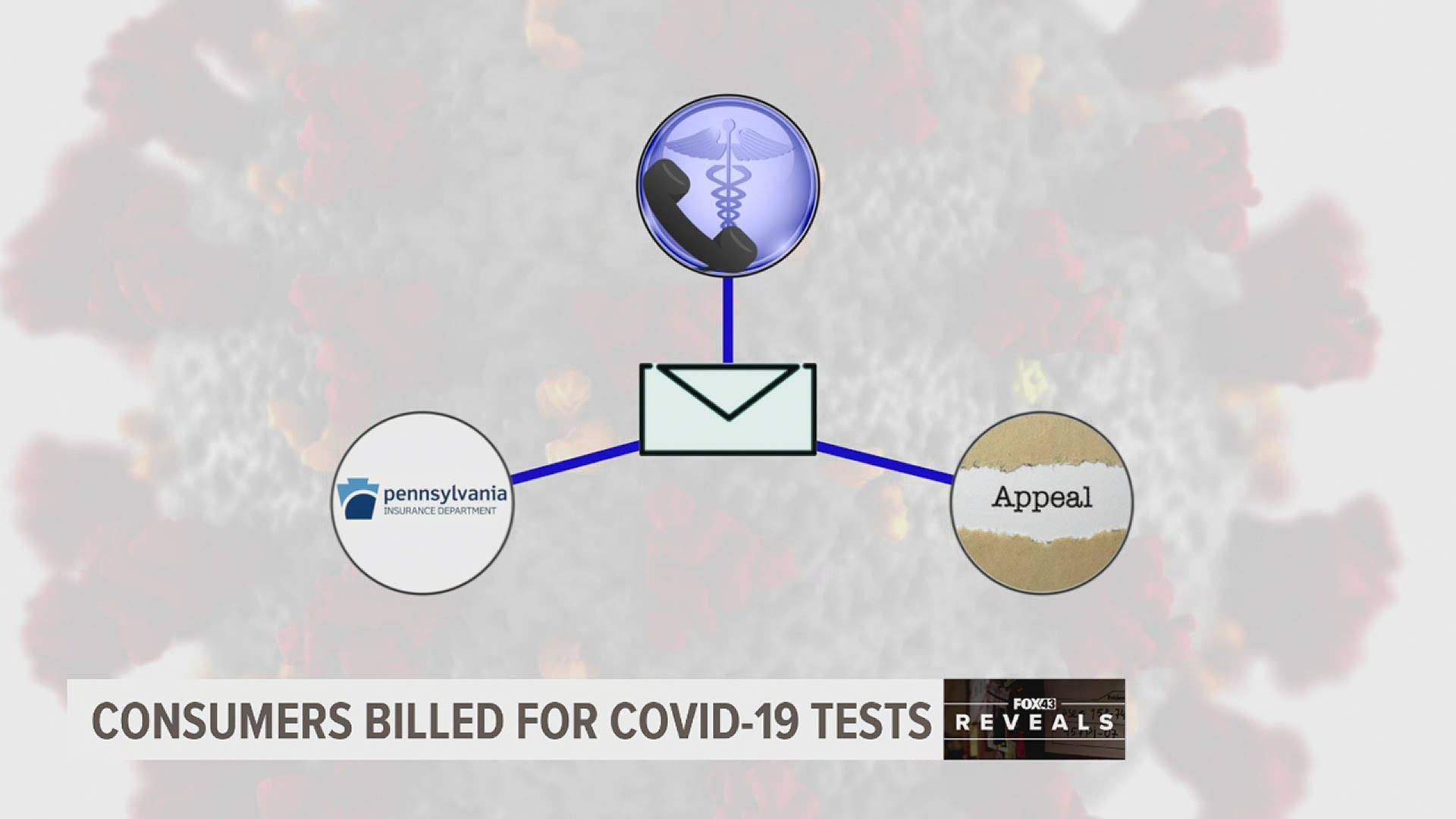HARRISBURG, Pa. — Under the federal CARES Act, COVID-19 tests are advertised as free to all Americans. FOX43 Reveals why some people may end up with the bill for that coronavirus test—and what to do if it happens to you.
Karen Pollitz, a senior fellow on health reform and private insurance with the Kaiser Family Foundation, has been tracking price-gouging related to COVID-19.
“Someone had been charged something like $6,000 for a COVID test and related services,” Pollitz said. “The law doesn’t limit what providers can charge for a COVID test or for related services so they can charge separately for the office visit. If they order additional tests, they can charge for those.”
Insurance companies have not been covering the costs of every COVID-19 test, leaving some patients with egregious medical bills.
“There are some providers that are out there that are clearly taking advantage of these loopholes so that they can charge as much as they can get away with,” added Pollitz.
FOX43 Reveals reviewed COVID-19 coverage policies at the top health insurance companies. Most insurers only cover coronavirus testing when it is deemed “medically necessary” by the physician administering the test.
“If the doctor says you need it, you can get it. But there could be a circumstance where you really want to do something, you really want to go get the test on your own and your doctor says you don’t really need that. Then, if that was a choice that you are making, it wouldn’t really be a healthcare benefit and it wouldn’t therefore be covered by your health insurance,” said Jessica Altman, Commissioner of the Pennsylvania Insurance Department.
United Healthcare
During the national public health emergency period, currently scheduled to end April 20, 2021, you will have $0 cost-share (copayment, coinsurance or deductible) for medically appropriate COVID-19 testing when ordered by a physician or health care professional for purposes of diagnosis or treatment. Tests must be FDA-authorized to be covered without cost-sharing. If COVID-19 testing is needed for your employment, education, public health or surveillance (monitoring) purposes, UnitedHealthcare will cover the testing when required by applicable law. Benefits will be processed according to your health benefit plan, and health benefit plans generally do not cover testing for surveillance or public health purposes.
Cigna
Cigna will cover out-of-pocket expenses for a covered COVID-19 diagnosis, testing through January 21, 2021, and treatment services through December 31, 2020. However, if you have gone out-of-network and received an unexpected bill for a COVID-19 diagnosis, test, or treatment, Cigna's COVID-19 Customer Protection Program (CPP) can help. This program is provided at no additional cost for eligible customers.
Anthem
All Anthem plans cover COVID-19 testing and the care visit where the test takes place with no out-of-pocket costs. A doctor must order a COVID-19 test for you.
Highmark Blue Cross Blue Shield
Yes, coronavirus testing will be covered with no additional costs when recommended by a medical professional. This waiver continues through March 31, 2021. In order for a COVID-19 test to be eligible for coverage under your health plan, the following must be confirmed before a test can be approved.
First and foremost, all tests must be ordered by a licensed health care professional unless the test is being ordered prior to an elective surgery. If deemed clinically appropriate, your physician must come to the conclusion that you’re showing signs and symptoms typically associated with COVID-19 — fever, cough, shortness of breath. In the event that you’re asymptomatic, a health care provider must determine that you’ve had known or suspected recent exposure to someone with the virus before a test can be performed.
Blue Cross Blue Shield
Your health plan covers FDA-authorized diagnostic testing for the COVID-19 virus when recommended by a medical professional. Some testing locations may not be in your health plan’s network. Some labs may not provide testing without a doctor’s order.
If you get a bill you think insurance should have covered, here’s what you can do.
First, contact your insurance company. Your healthcare provider may have used the incorrect billing code for the test. Second, consider filing an appeal with your insurance company. They may reverse their decision and pay the claim. Finally, reach out to the State Insurance Department.
Commissioner Altman: We handle tens of thousands of consumer complaints and inquiries every year, helping with claims issues like this.
Rachel Yonkunas: Has your department received many complaints regarding this topic?
Commissioner Altman: You know, we really haven’t which is great. We don’t want to see issues, but we don’t want that to be because consumers don’t know where to go or because consumers are paying bills that they shouldn’t pay without asking questions. It’s really important to get the word out that you really shouldn’t be getting those bills and we’re really a resource if that is a problem for you.
If you do not have health insurance, ask your doctor to bill the CARES Act Provider Relief Fund. The fund allows healthcare providers to bill the government for charges you would otherwise have to pay. To learn more about who is eligible and what is covered by the fund, visit the U.S. Department of Health and Human Services’ website.
FOX43 Reveals issues that affect you and your family to keep you informed. Do you have a story you want us to investigate? Send us a confidential email at FOX43reveals@FOX43.com.

